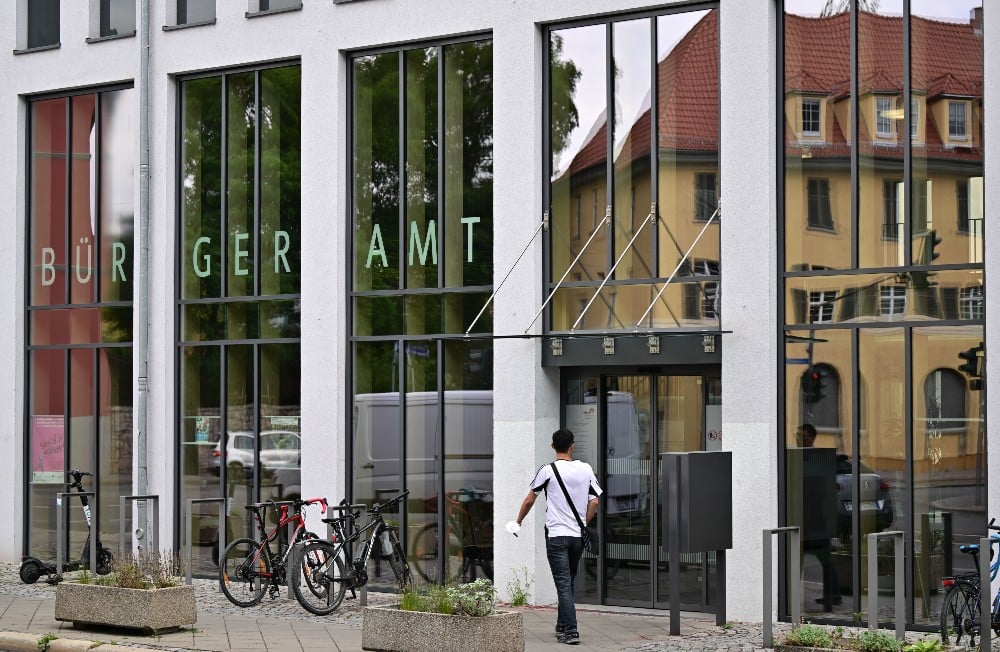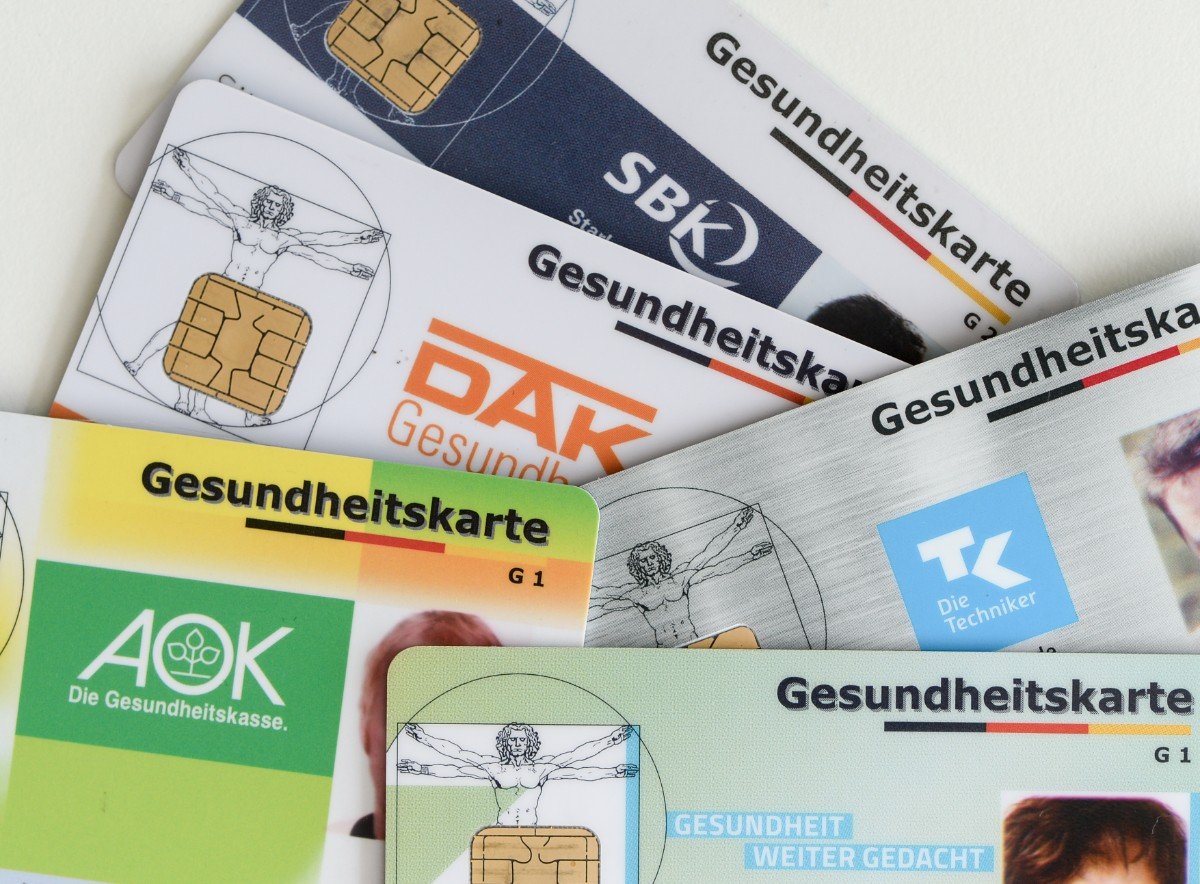There’s a fair amount of paperwork involved with moving to Germany, and it can be hard to know where to start. We look at the first documents you’ll need to apply for, or be aware of, when you arrive here.
Aufenthaltstitel (residence permit/visa)
Unless you have citizenship for an EU country, you’ll need to apply for a residence permit (Aufenthaltstitel) to live in Germany.
There are plenty of permits to choose from, whether you’re coming to study, for a job, to work as a freelancer or to reunite with a spouse.
EXPLAINED: How to apply for a residency permit online in Berlin
Depending on where you’re from, you might need a visa to enter Germany in the first place.

People walk with luggage at Berlin’s main train station (Haputbahnhof) on July 17, 2025. (Photo by Tobias Schwarz / AFP)
Only a selection of third country nationals get visa-free travel to Germany. People from the US, UK, Canada, Australia, Brazil and Japan, for example, are allowed to spend 90 days in the EU in every 180 without needing a visa. However, they will have to get familiar with the EU’s new Exit and Entry System rules known as EES.
Before you can apply for most residence permits, however, you’ll first need to gather a few of the documents listed below.
READ ALSO: Expert tips for your next appointment at a German immigration office
Meldebescheinigung (registration certificate)
Once you arrive in Germany, you’ll have to register your address – often referred to as Anmeldung – within two weeks.
To do that, get an appointment at your local Bürgeramt (citizen’s office).
There you’ll be issued with a Meldebescheinigung (registration certificate), which is needed for almost everything, including opening a bank account, getting a residence permit, or even to get a library card.
When you go to your appointment at the Bürgeramt, you’ll need to bring another document to register your address. This is the Wohnungsgeberbestätigung, or confirmation of residence, which verifies that you’ve moved into the property either as a main tenant or subletter.
Ask your landlord, Hausverwaltung (property management) or the main tenant that you’re renting from and they should give you this document. You can also make it easier for them by finding an example of one online, printing it and asking them to fill it in.
Advertisement
There is a big problem in busy housing markets, like Berlin and Munich, with tenants subletting flats and rooms and not giving people the option to anmelden (register). This is often the case when main renters haven’t told their landlord that they have someone else staying in the apartment.
All of this isn’t allowed but is sadly something many newcomers in Germany have to deal with.
READ MORE: Is renting a flat ‘without Anmeldung’ illegal in Germany?
When you do get your Anmeldung, keep it in a safe place! It’s needed for various bureaucratic processes in Germany.

A man walks to the Bürgeramt, one of the many centres of German bureaucracy. Photo: picture alliance/dpa | Martin Schutt
Steueridentifikationsnummer (Tax ID)
Once you register your address, you will receive another important document: your tax ID or Steuer-ID. It will arrive in the post.
This is another bureaucratic necessity like the Anmeldung, that you don’t want to lose. Make sure to take an extra note of the number.
You need your tax ID for various parts of German life such as your job, taxes, other financial matters and when talking to the Finanzamt.
By the way, if you are planning to be freelance or go into another type of self-employment, you need another tax related document called the Taxnummer (tax number). This isn’t given automatically to you, you have to apply for it at the Finanzamt.
Advertisement
Krankenversicherungskarte (health insurance card)
Everyone in Germany has to have health insurance (Krankenversicherung) – it is mandatory.
You will either register with a public or private health insurer, depending on various factors such as your job, how much you earn, your own situation and your age.
With the card, you’ll be able to visit doctors in Germany and receive health treatment. There is generally no extra cost on top of your health insurance fees, although residents do have to pay a contribution for things like prescriptions.
When you have health insurance, you are also able to access a Versicherungsnachweis (health insurance certificate). This document is needed when you need to show proof that you have health care coverage. For example, this is usually required when applying for a residence permit.
READ ALSO: 10 key things you need to know about healthcare in Germany

A selection of health insurance cards. Photo: picture alliance/dpa | Jens Kalaene
Bankkonto / Girokonto (bank account)
Another piece of bureaucracy you need is a current bank account. This is essential for receiving salary payments, sorting out your rent and bills as well as for general daily life in Germany.
If you’re coming from outside of Europe, you may be able to access your account in your home country to make electronic payments, or get cash from an ATM (Geldautomat), but you’ll likely need a Germany- or Europe-based account with an IBAN for getting paid and other transactions.
Most landlords and employers also require you to provide your IBAN so it’s a good idea to get this sorted quickly.
READ ALSO: What are the best banks for foreigners in Germany?
Advertisement
Sozialversicherungsnummer (Social Security number)
Another must-have in Germany if you are working is a social security number. You will usually receive this in the post during the process of starting your first job in Germany. But you can contact the Deutsche Rentenversicherung (German pension insurance) yourself if you need something from them.
It’s a good idea to keep your number written down somewhere safe. If you lose your card or certificate, you can request a replacement from your health insurance provider or the pension office. For confirmation of your social security contributions, your employer can provide this.
Every year, you’ll also receive official statements showing your pension contributions and details of your health insurance. These documents are important because they’re used later to calculate your statutory pension.
Rundfunkbeitrag (broadcasting licence fee)
Many foreigners are shocked to find that they receive a letter soon after registering in Germany telling them have to pay a TV / radio licence fee – known as the Rundfunkbeitrag – even if they don’t watch German TV.
Unfortunately, there’s no way around this payment. It’s mandatory, with almost every household having to pay the fee which works out at around €18.36 per month.
If you’re in a shared flat, you’ll share the cost with your roommates. If you live alone, you pay it in full.
READ ALSO: How to pay Germany’s TV tax (or legally avoid it)
Advertisement
Kirchensteuer (church tax)
One last thing to be aware of when you are settling in Germany is church tax.
The key thing to know is that you only pay this tax if you declare that you’re part of a particular religious community. For instance, if you are Catholic, Protestant or Jewish, you’ll pay the tax. It amounts to 8-9 percent of your income tax, depending where you live.
You initially declare whether you belong to a religion or not on your Anmeldungsformular (registration form) when you are registering your address. If you opt out and say you are not religious, you won’t have to pay. However, if you were baptised or are on a church registry (even in your home country) you could also end up paying church tax.








